How to Find Your Set Point Weight
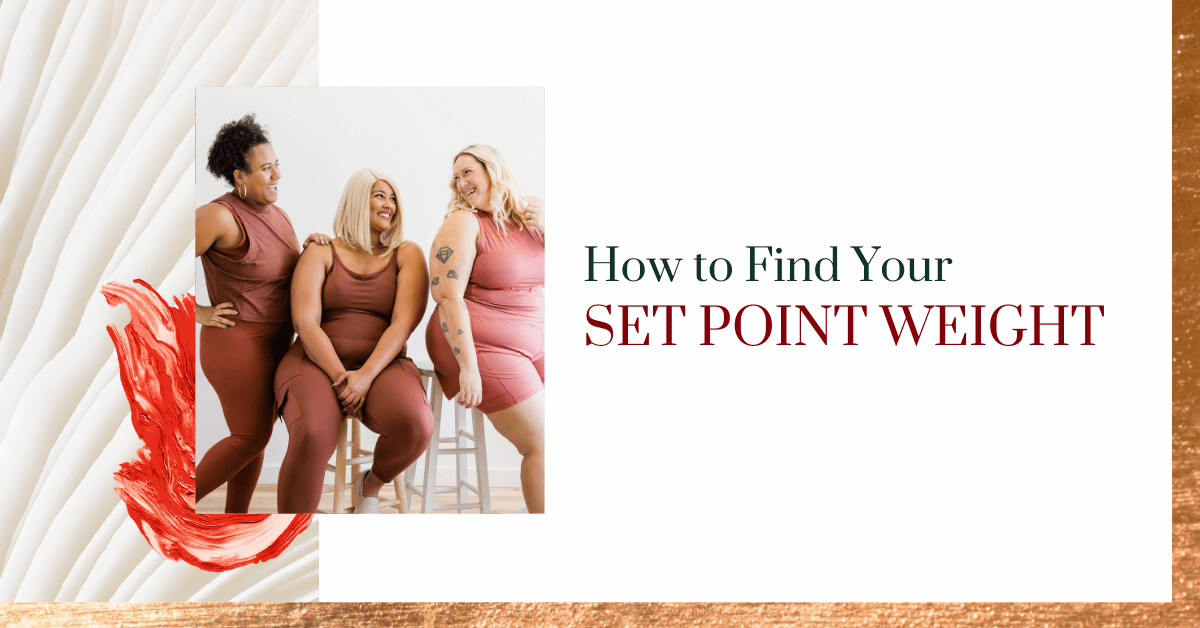
Learn more about set point theory, the biological mechanisms behind it, how dieting affects your set point, and what to consider if you’re trying to find your set point weight range. (Hint: It’s not what you think!). I also share more about why I actually consider set point theory to be unhelpful a lot of the time.
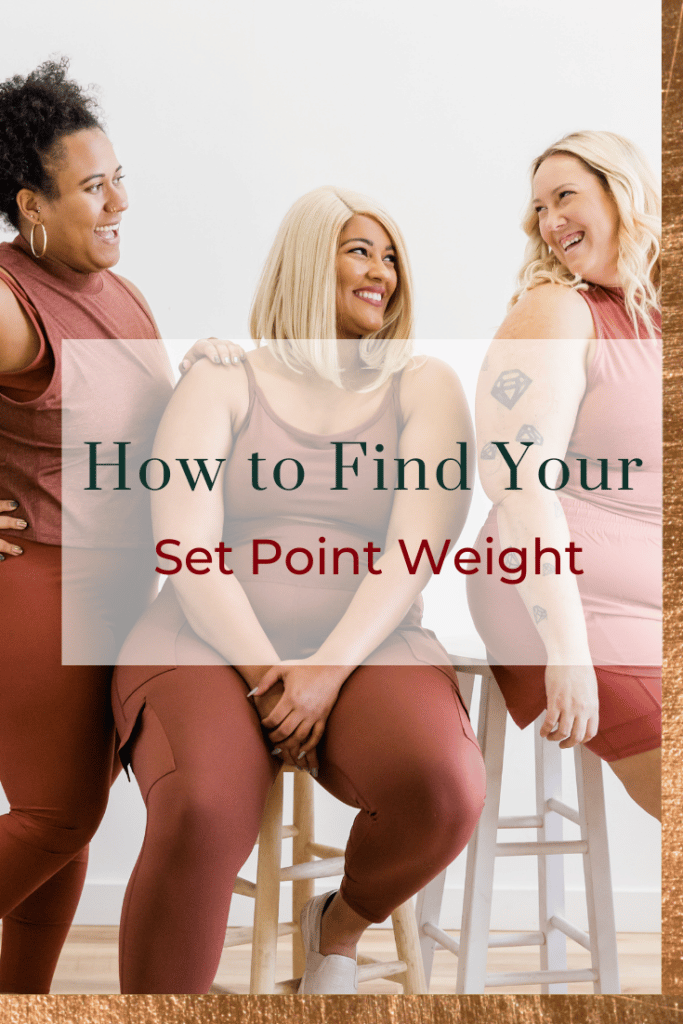
What is Set Point Theory?
Set point theory describes how an individual body is genetically programmed to stay within a certain weight range. As a person loses or gains weight, their body compensates to get back into that set point range.
It’s estimated that the average person’s set point range can vary by 10 to 20 pounds, though it’s often a much larger range if you’ve been restricting and dieting.
Without any external interference, our bodies respect our set point weight range (even if society and the culture at large do not). But this system, this delicate balance of homeostasis, only works the way it’s supposed to if we let it.
Your Set Point Can Change
Your set point weight range is not set (no pun intended) in stone. It can change over time due to things like genetics, weight-loss attempts, hormonal shifts, and aging. That’s because, despite what diet culture says, you aren’t meant to stay the same weight for your entire life.
Everyone’s Set Point is Different
For many people, their set point weight falls on the higher end of the spectrum, into the “overweight” or “obese” BMI categories. This is completely normal. We are not all meant to have the same size body, just as we are all not meant to have the same height, foot size, or hair color.
Body size diversity is inherent within a population and is something that we can—and should—respect rather than trying to change.
Dieting Can Interfere with Set Point
Dieting or manipulating food and exercise to try to “control” your weight messes with the body’s system and this delicate homeostasis starts to break down. Your body fights even harder to regain control of your weight-regulation mechanism. And your body pulls out all the stops to try to keep your weight within its genetically programmed set point range.
That means that whenever you drop lower than your set point, your body feels threatened (it thinks starvation is on the horizon), so it does everything it can to help you regain weight…even if you’re trying not to.
Your body fights against this weight loss and restriction in a variety of ways:
- Your metabolic rate decreases (aka the number of calories your body needs each day to stay alive)
- Your thyroid activity decreases (which is involved in regulating metabolism)
- Levels of your fullness hormones decreases
- Levels of your hunger hormones increase
- Your desire for calorie-dense foods increase
Biologically, this makes sense: If you really were starving, calorie-dense foods and an increased appetite would be a great way to save your life.
These biological mechanisms that kick off after dieting is why two-thirds of people not only regain the initial weight they lost after the diet, but also put on some “extra” pounds post-diet. The body increases weight a bit higher than it was before to protect against subsequent attempts of thermostat fiddling (that is, future diets).
With every attempt to diet, the rate of weight loss slows down, which is the reason you might find that the weight comes off easily during your first diet, but subsequent attempts don’t have the same results. Over time, chronic dieting can increase your set point weight range, and these biological responses kick in even if you are at a higher weight than “usual.”
Let me be clear: this is not your “fault”. It’s not due to any lack of control or willpower: this is your body doing what it was designed to do.
Is It Possible to “Find” Your Set Point Weight?
At this point, many people ask me, “Well, how can I figure out my set point weight?” or “How long will it take for my weight to stabilize in my set point range?”
If I were to put my nutrition therapist hat on (which, let’s be real, is pretty hard for me to take off!), I’d be curious to understand why you want to know what your set point is.
When I ask my clients this question, it often comes back to being uncomfortable at their current weight, fearing more weight gain, and/or hoping they’ll lose weight if they keep doing this intuitive eating thing. Given the fatphobic culture we live in, it’s very normal to feel this way.
This is a great place to dig deeper to uncover your beliefs about body size. Can you get curious about all the things you believe about your body?
- Who gave you those ideas?
- Where did you hear those messages? (Common places: family, peers, media messages, etc)
- Who is benefiting from all the ways you think you don’t measure up?
- Who is profiting from you believing you need to change yourself?
The thing is, whenever you try to control your weight—even to “get to” your set point—your body will interpret this as restriction which sets off the deprivation-binge pendulum and the dieting cycle.
At the end of the day, there is no objective way to determine what your set point weight is (and anyone who says there is telling you some total BS).
Trying to “figure it out” or worrying whether you are above or below it only keeps you stuck in the dieting cycle and disconnected from your body.
Set Point Theory Can Be Unhelpful
That disconnect is one of the reasons why I find set point not to be a helpful concept to most people. It continues to put the focus on weight, which can keep you in the dieting cycle.
I think set point theory can be helpful to explain and understand why dieting trying to “control” weight doesn’t work. My hope is that you won’t get caught up in whether you’re at your set point.
Instead, just know that when you eat based on internal cues and stop trying to interfere by dieting, your body will eventually settle within your set point weight range. Emphasis on range because, even when you’re not dieting, your weight will naturally fluctuate and change over time.
Also, I put emphasis on eventually because when you stop dieting, it’s common to initially gain some weight as you let go of restriction and go through a period of food habituation.
It’s impossible for me or for you or for anyone to know what is going to happen to your weight when you stop dieting and work on intuitive eating. Some people gain weight, some people lose weight, and some people’s weight stays the same.
Remember, most people’s set point weight range is actually not in the “normal” BMI – a lot of people have a set point that may be “overweight” or “obese” (put in quotes because BMI is total BS).
The Unknown Can Be Scary
I know that the unknown can feel scary or anxiety-inducing. Especially if you’ve been told your whole life that weight gain and larger bodies are not ok and if you’ve been on the receiving end of weight stigma and bias.
If there’s still part of you that is unsure about all of this, that’s OK. At some point in your life, dieting and the pursuit of weight loss may have been something that served you. Perhaps it made you feel safe, accepted or in control.
And if you’re still thinking “but I want to/need to lose weight”, that is OK – it makes so much sense, when in doing so we are promised acceptance, belonging, health, and happiness. The idea of giving up the idea of losing weight can bring about the (legitimate) fear of being judged, disrespected, cast aside, or worse.
I do not shame anyone who attempts to lose weight and conform to our society’s body ideals. Very real oppression exists for people who hold marginalized identities, including women, people of color, and fat folks, so it’s understandable that someone would want to protect themselves from this injustice by losing weight.
I can’t and won’t ever tell someone what to do with their body. However, I can encourage you to start to unpack and dismantle the false beliefs about food and body size that society has programmed into you.
Because it is possible to find true physical, mental and emotional health – and live your most authentic, value-aligned, unapologetic life – no matter what your body size or set point weight.
If You’re Looking For More Support:
My team and I offer virtual one-on-one nutrition therapy and body image healing support Learn more about our virtual intuitive eating nutrition coaching packages.
Check out my Unapologetic Eating 101: Foundations of Intuitive Eating Course, an online, self-paced program to liberate yourself from dieting and make peace with food and your body.
My book, Unapologetic Eating: Make Peace with Food and Transform Your Life, is also a great resource that includes information, research, and reflection prompts to help you move away from dieting and come back home to your body, so you can live your most unapologetic, liberated life.
Author Bio
This article was written and reviewed by Alissa Rumsey, MS, RD, CSCS, a registered dietitian and Certified Intuitive Eating Counselor. She specializes in weight-inclusive care, intuitive eating, body image healing, mindfulness, self-compassion, and healing from chronic dieting, disordered eating, and eating disorders. Alissa holds a Bachelor’s Degree in Nutrition and Exercise Science, and a Master’s Degree in Health Communications, and is also an NSCA Certified Strength and Conditioning Specialist.
5 Comments
Leave a Comment
share the love
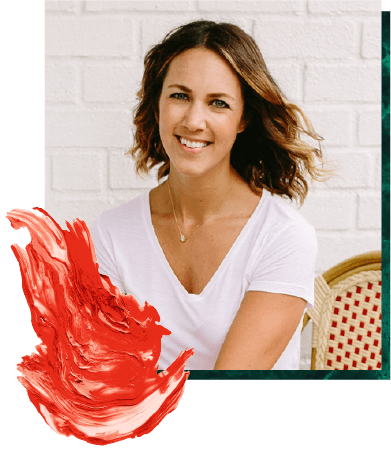
about
Alissa Rumsey, RD.
Alissa Rumsey, MS, RD, CDN, CSCS (pronouns she/her/hers) is a registered
dietitian, nutrition therapist, certified intuitive eating counselor, and the author of
Unapologetic Eating: Make Peace With Food and Transform Your Life. Alissa is
passionate about helping people reclaim the space to eat and live,
unapologetically.

A twice-a-month round-up of inspirational stories, lessons, practical tips and encouragement for living your most authentic, unapologetic life.
The Unapologetic Life
RECENT POSTS

The Unapologetic Life
A twice-a-month round-up of inspirational stories, lessons, practical tips and encouragement for living your most authentic, unapologetic life.






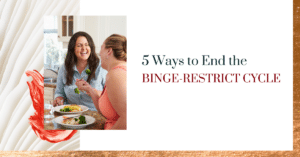
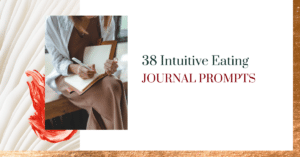
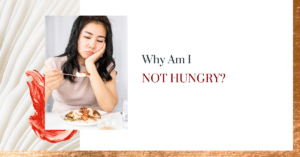
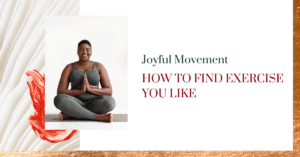

This is all really interesting but every single intuitive eating coach I have seen (Ive been looking for a while) is in the ‘normal looking’ average body size. It seems completely out of touch and even naive for a thin person to say that we should just accept being plus size and be happy about it when you likely have no idea what that life experience looks and feels like. If I am wrong please please give me some examples. I am desperate to get off the diet roller coaster and it seems like intuitive eating should be the method. But it also seems to me that intuitive eating is really…’just accept that you will always be fat and go enjoy your cookies.’
Hi Kimberly, I totally hear you. First off, I want to send you so much compassion for the struggles you’ve had with dieting. Diet culture and the media constantly put out this message that in order to be “healthy” or “beautiful”, a person must be thin, wrinkle-free, not have gray hair, etc. which is just not true. I want to respond to a few things you mentioned in your comment.
1. You are absolutely right that many dietitians and coaches in the intuitive eating space have straight-sized bodies (myself being one of them). And there is no way for me to know what it’s like to live in a larger body, because that has not been my lived experience. What I (and some other providers) have done is tried to learn from those with different lived experiences so that I can better hold space for the struggles my clients face. I’ve learned from folks that are neurodivergent, people who are self-proclaimed fat, LGBTQ+ folks, disabled people, BIPOC people, etc. It’s not fair for me to say “accept your body as it is” and just leave it at that when I don’t have that lived experience as you said.
2. There are a lot of folks who have larger bodies that are in the intuitive eating space/body liberation movement. For some suggestions, you can check out this blog post: https://alissarumsey.com/body-positive-instagram-accounts/. Unfortunately, due to the weight bias baked into social media algorithms, a lot of the time these people are not the ones who get the accolates and attention; often their content is “shadow banned” by the apps.
3. It makes so much sense why body acceptance would be hard if not impossible for bodies who are marginalized by society, including larger bodies. Weight bias is a real thing, and even if everyone accepted their own individual body, it doesn’t take away from the fact that stigma and bias are incredibly harmful to fat folks. This is why, in my work with clients, a lot of time is spent critically examining the systems and structures in place that impact their body image. When it comes to individual body image healing, there are a variety of terms that people often find to help guide that process. Some resonate with some folks, and others not so much. Body acceptance is one, others include body appreciation, body love, body neutrality, body positivity, etc. I never would tell anyone how they should feel about their body, and I absolutely understand that “just accepting” how one’s body looks may be impossible. Everyone has body autonomy, and gets to choose to pursue weight loss if that is what is best for them.
4. The intuitive eating framework is one framework (out of several) that some people find helpful as a way to support them in letting go of dieting, reconnecting to their body, and finding a way of eating that is nourishing and supportive rather than restrictive and controlled. A component of the framework is the idea of “body respect” – that is, can you respect your body, even if you do love how it looks or even accept it? Can you respect it by feeding it adequately, responding to it’s cues (if you have them), moving it when it needs to, feeding it nourishing foods, dressing it in comfortable clothes, etc (body respect can look different person to person, these are just some examples).
I hope this helps, please let me know if you have any other questions or thoughts.
Hi Kimberly!
I hear you… I am a fat human myself and have struggled with diets and food for a very long time. And yes it also frustrates me that so many dietitians and intuitive eating coaches have thin bodys. That is not to say they are no experts and can help but it´s just different if you know the pain and know the price of being fat. You know I would take a miracle to instantly loose a lot of weight even though I like my body because yes it is easier. But we all know that doesn´t work and I am not willing to pay my life quality in exchange for it (for example these horrific operations or strict diets for a life time).
As far as I know we only have three real options:
1) Having a restrict diet for a life time or operation (but even then longlasting weight loss is not guarenteed) to become thin.
2) Hating your body, have food as an enemy and try to circumvent basic biology with “tricks” such as eating at specific times or small food groups.
3) Yes… accepting that you will stay fat and MAYBE loose some weight when you listen to your body´s cues. That brings a lot of emotion. For me it was sadness that I may never ride a horse. But it brings so much peace in the end, you radiate that, people are attracted to you and you start seeing yourself in a different light.
What should I do since I’m on medicine that makes me hungry?
Some things to keep in mind: intuitive eating involves both body AND brain knowledge. Your body cues will be telling you that you are hungry – even if it’s related to the medication, this hunger cue still means you need to eat. And you can use some brain knowledge to incorporate foods with protein, fat, and fiber, all of which can help promote fullness and satisfaction. I’d also recommend working with a dietitian who specializes in this area, if you need some more support. Best of luck!